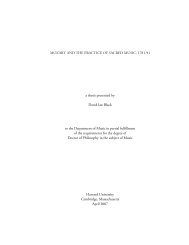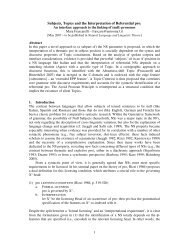draft of November 2011
draft of November 2011
draft of November 2011
Create successful ePaper yourself
Turn your PDF publications into a flip-book with our unique Google optimized e-Paper software.
that the definite is a noun phrase. 19<br />
(58) pianu martira arnithikan na eksetasun tin katathesi<br />
who-gen witness-gen refused-3pl subj examine-3pl the-acc testimony<br />
Whose witness testimony did they refuse to examine?<br />
The facts reviewed in this section 20 indicate strongly that the Greek article does not behave<br />
like a D head while there is evidence that definite nominals allow extraction possibilities typical<br />
<strong>of</strong> noun phrases that are not DPs. 21 We will, therefore, assume that the article is not a D<br />
head, but rather a prenominal modifier and that Greek nominals, definite and indefinite, are<br />
uniformingly Number Phrases. 22 Definites then are just definite Number Phrases. Further,<br />
19 Horrocks and Stavrou (1987) in fact use this type <strong>of</strong> evidence to argue for a DP; they link long possessor<br />
extraction as in (58) with focus movement within the nominal as in (i). They argue that tu protu martira<br />
in (i) moves to a position internal to the nominal exactly like the wh-phrase in (58) moves to CP. They take<br />
the article to be a D head allowing focus-movement to its Spec. While examples like (i) necessitate movement<br />
internal to the nominal, it is not necessary that this is to Spec,DP as we will see shortly.<br />
(i) arnithikan na eksetasun tu protu martira tin katathesi<br />
refused-3pl subj examine-3pl the-gen first-gen the-acc testimony<br />
They refused to examine the first witness’s testimony.<br />
20 We note that, unsurprisingly, Italian patterns with English and DP languages with regard to the diagnostics<br />
proposed by Bo˘sković (2008).<br />
21 Bo˘sković (2008) discusses some further generalisations which are either not relevant for Greek (e.g. supe-<br />
riority effects for multiple wh-fronting) or are trivially relevant: for instance, Greek most is i perissoteri (=the<br />
most), that is it implicates the definite article and has the expected reading <strong>of</strong> more than half; in addition,<br />
Greek allows clitic doubling since it has articles. Boskovic links clitic doubling to the existence <strong>of</strong> DPs and,<br />
indeed takes the referentiality <strong>of</strong> clitic doubling structures as a consequence <strong>of</strong> the involvement <strong>of</strong> D. The<br />
facts discussed in this paper are a counter example to these correlations. Firstly, Italian, which clearly has<br />
DPs allows non-referential readings, whereas Greek, which certainly allows NPs does not allow non-referential<br />
readings in doubling structures.<br />
22 This is not too far from Kolliakou (2003) who takes the definite to be an argument <strong>of</strong> a noun appearing at<br />
its Spec. Further, she assumes that definite and indefinite nominals are all noun phrases; in her HPSG analysis,<br />
any lexical category specified for the head feature nom (in turn specified for number, gender and case) can<br />
project a nominal; apart from nouns, articles, numerals and adjective share this head feature reflecting the<br />
fact that any <strong>of</strong> these categories can project a nominal argument on its own.<br />
33
















